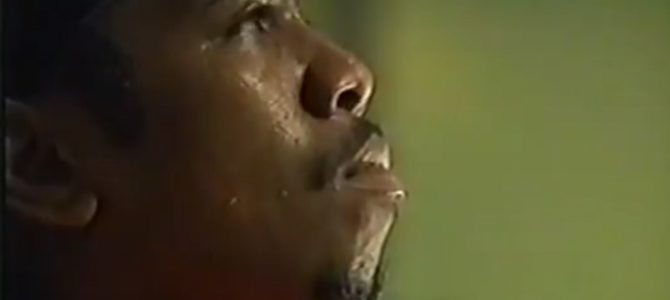ESPN started its “Original Entertainment” brand in 2001, a division that later turned into “ESPN Films.” Among its products are or were talk shows (“Pardon the Interruption,” “Jim Rome Is Burning”), reality shows (“Bonds on Bonds,” “Madden Nation”), and movies (“A Season on the Brink,” “Hustle”). But its most daring and curious product was 2003’s short-lived football series “Playmakers.”
“Playmakers” followed a fictional football team (the Cougars) in a fictional professional league (“The League”). It focused more on the game than its younger, tamer cousin “Friday Night Lights,” although not by much.
The football usually took a back seat to team and personal drama. Players struggled with or embraced the physical toll of the game, drugs (performance-enhancing and recreational), abuse, fidelity, aging, and other “ripped from the headlines” issues emanating from professional sports.
The reviews were generally positive, with the most common criticism being its overindulgence in players’ vices. Alessandra Stanley at The New York Times called it “great fun to watch” despite wondering why ESPN, of all channels, offered such a tonal shift. Tim Goodman seemed irritated that ESPN aired fiction when their job was to show the very thing “Playmakers” mimicked.
No, it never rose to the level of “great” television, especially by today’s standards. The 11-episode season allowed for little character development beyond each player’s immediate crisis or the episode’s plot. Narration and flashbacks did too much heavy lifting. At its worst, nearly a season’s worth of subplots take place during one halftime, including one player’s cocaine withdrawal (again during halftime). But the schlocky, soapy element at ESPN, of all places, outweighed the occasionally poor writing.
Its “warts and all” quality also felt cathartic. Yes, it delivered drugs, sex, and other clichés with the subtlety of a Babylon Bee headline. But it mostly worked because they never felt that outlandish a facsimile.
Too many threads in the show have some NFL equivalent: drugs before a game, drugs during a game, an incriminating cocaine video, cheating a drug test, the painkiller diet, a gay player (although this one at least played), a coach with prostate cancer, a false statement to police, and domestic violence—including, astoundingly, Woody Paige in a fake “Around the Horn” segment saying, “Just leave it to [Jay] Mariotti to give us his uniquely amoral view that beating your wife doesn’t matter.”
ESPN canceled the show after one season despite the reviews, strong ratings, and relative veracity. The main reason? The NFL (influence they’d wield again a decade later). Then-commissioner Paul Tagliabue called it a “gross mischaracterization of our sport,” even complaining to then-Disney chief Michael Eisner. The decision only added to the idea that the show simply revealed the sport instead of sensationalizing it.
The brand itself disappeared almost as quickly as the show. No services stream it, although a few watermarked episodes pop up on YouTube. Amazon offers used copies. Of the main cast, only Russell Hornsby (running back Leon Taylor) and Tony Denison (Coach George) moved on to bigger things. But at least the show’s website lingers in all its mid-aughts glory.
“Playmakers” could have survived during this “Peak TV” era. Imagine a season taking on Bountygate, head trauma, or a real estate mogul desperate to own a team. The NFL’s complaints might carry less weight today, considering their (relatively) diminished stature and the abundance of content providers eager to snap up something that moves the needle.
It had the critical acclaim to survive low ratings, although it had good ratings. Or did it stand out in its time precisely because of who aired it? Any network could make a cliché-riddled show about sports. But for ESPN to show highlights and press conferences one hour and “Playmakers” the next? Maybe that’s what drew viewers: the idea that the network that helped create the curtain was pulling it back.









